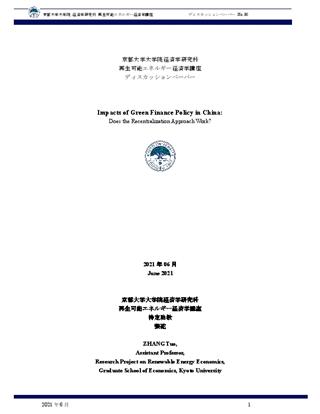TOP > ディスカッションペーパー > No.36 Impacts of Green Finance Policy in China:Does the Recentralization Approach Work?
No.36 Impacts of Green Finance Policy in China:Does the Recentralization Approach Work?
2021年6月
京都大学大学院経済学研究科
再生可能エネルギー経済学講座
特定助教 張砣
 Abstract:
Abstract:
“Collusions between local governments and firms” and its impacts on environmental governance have been paid a great of attention by scholars in China. The central government carried out a series of re-centralization measurements to deter the collusions. By using the National Private Firm Survey datasets, we employ the Tobit model and Propensity Score Matching approach to investigate the relationship between political connections and corporate mitigation investments, from the perspective of the re-centralization trend. We find that political connections have significantly improved corporate mitigation investments. Furthermore, through establishing the mediation effect model, we find that private entrepreneurs mainly use political connections to obtain bank loans with lower interest rates, while formal financial institutions such as banks have higher requirements according to the green finance policies. Therefore, the positive effects of political connections on mitigation investments are mainly mediated through formal finance. Our research thus has important policy implications on the ongoing re-centralization trends in environmental governance in China.
Keywords:Political Connection; mitigation Investments; Green Finance Policy; Recentralization

